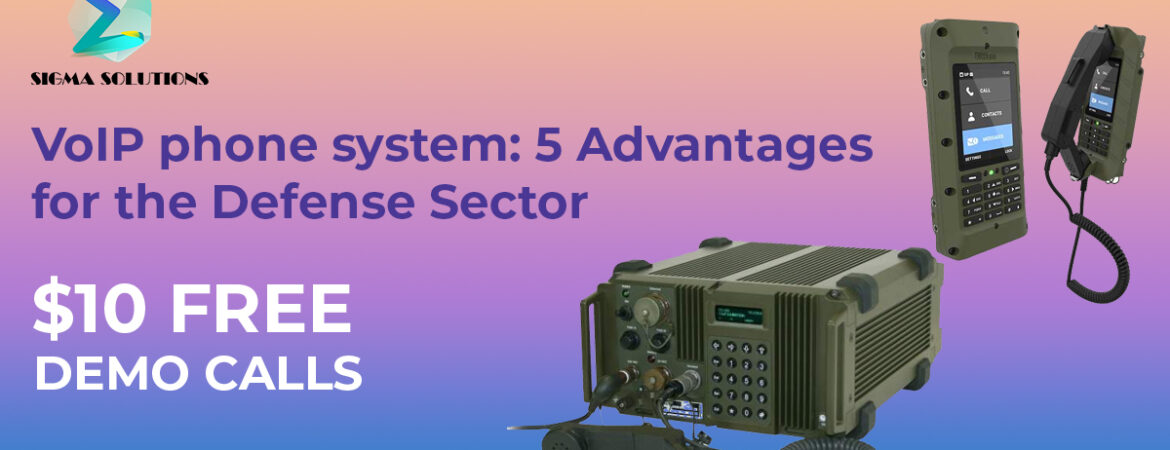
VoIP (Voice over Internet Protocol) has lately acquired popularity as a low-cost and dependable method of transmitting voice data. People use VoIP phone systems for their landlines, business phone, and even mobile phone. In addition, several military and government branches have begun to use VoIP technology, both for standard phone service and for more covert communication services.
VoIP is a method of transmitting audio and video data over the Internet. This implies that sending phone calls via the Internet is less expensive and efficient than a regular phone line. In addition, VoIP service enables servicemembers and their families to make secure messages, such as birthday greetings to loved ones far away or executing top-secret missions safely.
VoIP in Defense and Government Applications
The military and government have also begun adopting VoIP phone systems for more secure communications. Therefore the military must always maintain safe, dependable, and clear communication since a failure in any of these might result in a life-or-death situation.
Wiretapping
One of the primary issues of military communication is security, which is addressed using VoIP telephony via secure networks for internal calls. While there has been some recent worry over the findings of a wiretapping test on select VoIP phone systems conducted by Columbia University, VoIP conversations are typically relatively safe and secure. Indeed, many VoIP conversations are so sure that the software firm Voip-Pal felt compelled to create and patent its “Lawful Intercept” protocol, which allows police and security personnel to record questionable calls lawfully.
VoIP Communications in High Definition
Important information is now preserved in translation because many VoIP services offer high-quality communication. For example, the letters “F,” “M,” “N,” “P,” “S,” and “T” on traditional phone lines often seem interchangeable, which can completely change the meaning of a message. It may also be difficult to distinguish between speakers or identify their identities over a bad conventional phone connection. High-definition VoIP addresses these issues by providing increased quality and clarity to minimize misinterpretation. This type of clarity may make all the difference in military communications.
Simple Implementation in War Zones
VoIP service is replacing conventional military communication methods because it may give faster service in regions where standard phone services cannot reach. This leads to more accurate and timely updates and speedier emergency reaction times. Furthermore, VoIP service is less expensive and requires less equipment.
The Voice on Net coalition reported in 2011 that the DoD (Department of Defense) has over 130 VoIP networks worldwide. In addition, the Defense Information Systems Agency (DISA) predicts that by 2017, 80% of the DoD will rely on Internet-based communication.
Overseas Military Personnel
Staying in contact with family and friends back home is difficult enough for those serving in the military overseas. In addition, due to the nature of the army operation, telephone use is sometimes limited or prohibited. Given these circumstances, troops cannot communicate with friends and relatives back home.
Fortunately, the military may supply troops with MWR (Morale Welfare and Recreation) facilities equipped with computers and VoIP services in some situations, particularly in volatile war zones. In addition, VoIP companies enable servicemembers to video chat with loved ones back home for considerably less than a typical phone call cost. In some instances, this service is even free. This kind of reliable communication can make all the difference in a servicemember’s outlook and performance.
Families of Military Personnel Stationed Abroad
Military families stationed abroad can also benefit from the low cost and ease of use of VoIP service. However, while troops may benefit from having their families stationed with them, this lifestyle may be difficult for families. As a result, servicemember families must have a dependable communication channel with relatives and friends back home.
Many military families choose a VoIP provider for home phone service in these situations. In addition, many VoIP providers charge per minute costs as little as $0.01/minute for international calling. In contrast, traditional phone companies charge over $3.00/minute fees. As a result, calls to the US are now more inexpensive, allowing for more extended and intimate conversations with friends and family back home.
Furthermore, because military families are frequently ordered to relocate on short notice, they may transfer their home VoIP service to their new location without the hassle of signing up with a new provider or acquiring a unique phone number. The number porting function of VoIP allows VoIP users to keep their same VoIP number regardless of where they are.
How has VoIP already helped in Military Services?
Since the military began experimenting with VoIP technology in the late 1990s, there has undoubtedly been an increase in military use of the service during the last ten years. By 2003, the military had begun using VoIP in Iraq and Afghanistan units. The Marine Corps quickly followed, implementing VoIP technology in its command and control combat centers to receive real-time battlefield intelligence, eliminating the information gap between mission departure and arrival. In addition, the Texas Lackland Air Force Base and the Illinois Scott Air Force Base pioneered the way in the VoIP service interface for the Air Force. Finally, in 2011, Voice on Net disclosed that the Navy had implemented VoIP services on its operational ships.
Conclusion
While military soldiers benefit from technological consolidation and increased reliability, and rapid communication with VoIP service, at the same time their families can appreciate the option to stay connected with loved ones who live far away. In addition, VoIP telephony is closing the gap between troops out in the field and their comrades at the base camp and the space between that military personnel and their friends and family overseas. All of these show the importance of VoIP in defence sector.


Leave A Comment